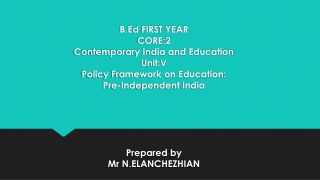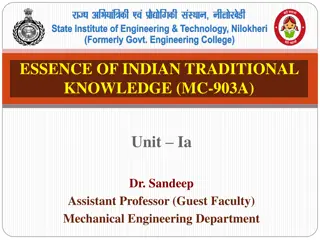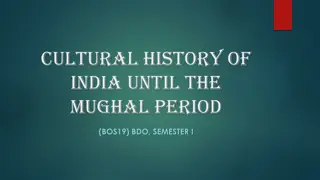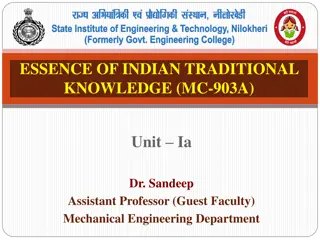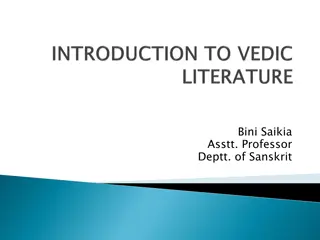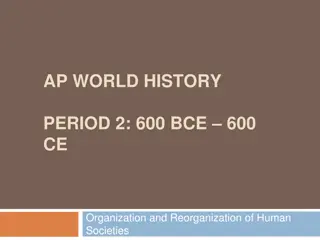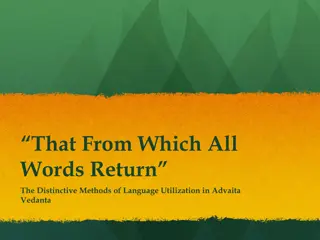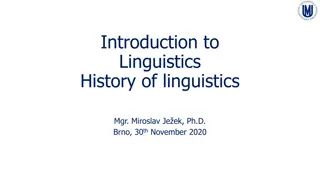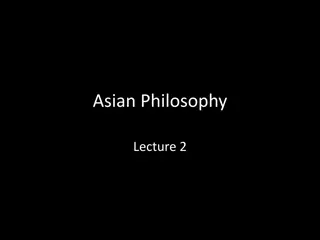Education in Ancient India: Vedic System Overview
The history of education in ancient India traces back to the Vedic system, rooted in the Vedas and emphasizing self-realization and liberation. The curriculum included Vedic literature, arithmetic, geometry, and spiritual studies, fostering academic freedom and discipline among students.
0 views • 9 slides
The Essence of Indian Traditional Knowledge: Vedic Culture and History
The Vedas, ancient religious texts of Hinduism, provide essential knowledge about existence and the divine. Believed to have always existed, they were orally transmitted before being written down between 1500-500 BCE in India. The Vedas are considered among the oldest religious works and are categor
1 views • 41 slides
Cultural History of India: Early Vedic Period and Aryans
The period of the Aryans in ancient India marked a transition from the Indus Valley Civilization to the Vedic Civilization. The Aryans, possibly migrants from various regions, integrated with the indigenous Dravidians to form the Vedic society. Their culture, as depicted in the Vedas and epics like
0 views • 10 slides
Essence of Indian Traditional Knowledge: Vedic Culture and the Vedas
The Vedas, ancient religious texts of Hinduism, are considered among the oldest in the world, passed down orally before being written in the Vedic Period in India. They contain knowledge about existence, not revealed at a specific historical moment but perceived by sages through deep meditation.
0 views • 41 slides
Education in Ancient India: Vedic System Overview
Education in ancient India began with teaching traditional elements like Indian religions, mathematics, and logic. The Vedic system of education was based on the Vedas, focusing on spiritual and materialistic knowledge. The ultimate aim was self-realization and liberation of the soul. The curriculum
0 views • 9 slides
Exploring the Vedas: Ancient Sanskrit Texts and Their Divisions
Diving into the roots of knowledge, the Vedas are ancient texts derived from the root meaning 'to know'. Various synonymous terms like ruti, tray vidya, gama, and chandas are used to describe these sacred scriptures. The Vedas consist of four main divisions - Rigveda, Samaveda, Yajurveda, and Atharv
0 views • 14 slides
Development and Influence of Hinduism and Buddhism in Ancient India
Explore the development and impact of Hinduism and Buddhism in ancient India from the codification of religious and cultural traditions like the Vedas and Brahman in Hinduism to the teachings of Siddhartha Gautama (Buddha) emphasizing the Four Noble Truths and Eightfold Path. Discover how these reli
0 views • 42 slides
Insights into Advaita Vedanta and Hinduism: Tradition, Knowledge, and Liberation
Explore the profound concepts of Advaita Vedanta and the rich diversity of Hinduism. Dive into the distinctive methods of language utilization, the tradition's reliance on Vedas and Upanishads, the criteria for valid knowledge, the essence of Brahman as the ultimate reality, and the challenges in kn
0 views • 15 slides
Evolution of Linguistics: From Ancient Times to the Middle Ages
Linguistics has a rich history spanning from ancient India with the Vedas and Panini's grammar to Greece with Plato and Aristotle, and through the Middle Ages with the influence of Christianity on languages like Latin. The development of grammar, syntax, and the preservation of literary works shaped
0 views • 41 slides
Insights into Ancient Wisdom: The Vedas and Origins of Existence
Explore the timeless verses of wisdom in the Rig Veda, understand the significance of deities like Agni and Indra, and ponder upon the deep philosophical questions raised in the Vedas about the origins of existence and the nature of reality.
0 views • 24 slides
